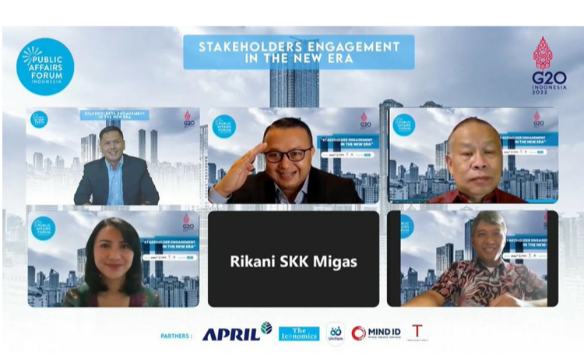Smart digitalization and personal trust are key to stakeholder management in the hybrid era
Public Affairs Forum Indonesia webinar (29 March 2022)
Post-event coverage
On 29 March 2022, Public Affairs Forum Indonesia (PAFI) hosted a webinar titled “Stakeholder Engagement in the New Era”. The webinar discussed strategies and best practices on how public and government affairs practitioners could navigate the post-pandemic landscape, where hybrid online/offline engagement is the new norm. Drawing over 450 people, the forum convened distinguished speakers from various backgrounds, including energy, personal care, and media:
1. Agung Laksamana, PAFI Chairman and Freeport Indonesia Executive Vice President
2. Arif Zulkifli, Tempo Media President Director
3. Nyimas Fauziah Rikani, Special Task Force for Upstream Oil and Gas Business Activities (SKK Migas) Senior Communication Manager
4. Melanie Masriel, L'Oréal Chief of Corporate Affairs, Engagement, and Sustainability
5. Daniel Rembeth, PwC Advisor to the Senior Partner on Government Relations and Public Affairs
Adra Janitra Hendrawan (Associate Director, Asia Group Advisors) moderated the forum.
COVID-19 ushered changes
The pandemic has undeniably changed our behaviour and the landscape we operate in. Pre-pandemic, we could easily organize in-person meetings to foster dynamic, organic discussions. Pre-pandemic, the delineation between ‘business hours’ and ‘off hours’ was also clearer. Nowadays, people are almost constantly working from home, plugged in to their social platforms, and inundated with information. Borrowing speaker Daniel Rembeth’s words, this is now the era of “always on”.
As we transition into the endemic era where hybrid will be a norm, public and government affairs practitioners must find new ways to maintain effective, meaningful stakeholder interactions. The speakers defined stakeholders quite broadly as “everyone affecting or affected by a company’s operations” – from regulators, media, industry associations, business partners and vendors, to employees.
Stakeholder engagement in the hybrid era: smart digitalization toward more responsive and data-driven interactions
Opening the webinar, Agung Laksamana argued for practitioners to have a “new mindset” –optimizing technology to foster interactions and opportunities behind crises. Agung reminded us that, while the pandemic has undoubtedly been a crisis, it also brings forth some new opportunities, such as how we could instantly meet our stakeholders via video conferences.
Echoing Agung’s point, Daniel Rembeth conveyed that digital platforms will be increasingly important. Public and government affairs practitioners should leverage digital channels in a smart way to obtain relevant information and “foster meaningful dialogues, not just monologues”. The market is now very dynamic, and practitioners must stay abreast with trends and offer updates to stay relevant.
Melanie Masriel underlined that digital data analysis has now emerged as a necessary skill for public and government affairs practitioners: they should identify the right digital channels and entry points to communicate their messages with internal and external stakeholders.
Ensuring trust and longevity of stakeholder relationships: ethics, personal connections, and messaging consistency
Stakeholder engagement must be seen as a long-term, continuous process. Practitioners must not see and treat stakeholders as a mere short-term means to an end – we need to engage stakeholders in a sustainable manner and win their trust. Arief Zulkifli shared his view on the importance of transparency as the core variable in building stakeholder trust. A key part to this is operating on the basis of ethical communication.
Another key part of building trust is personal connection. To this end, Nyimas Fauziah Rikani noted the importance for practitioners to listen more intently to stakeholders about their needs and expectations. When communicating virtually, practitioners must also overcome the challenge of reading body language and building organic chemistry.
Rikani also advised organizations to ensure linguistic consistency across communication channels. While the modes of communications may be tailored to stakeholders’ characteristics and needs, an organization’s key messages must remain consistent to maintain credibility. In the digital era, one’s networks and information sources could easily multiply.
Q&A
An audience member raised a question on the success metric of stakeholder engagements conducted by public and government affairs professionals.
Nyimas Fauziah Rikani opined that the main metric should be how such engagements help further the practitioners’ institutional goals. The establishment of a ‘good’ working relationship with stakeholders can also be a success metric – good here defined as the stakeholders’ openness to formal and informal lines of communications. In this vein, Daniel Rembeth suggested that a successful engagement enables practitioners to easily secure subsequent meetings with stakeholders, or make the practitioners be perceived as trusted advisors.
In terms of methodology to measure engagement success, Melanie Masriel suggested that practitioners can launch stakeholder surveys in collaboration with independent third parties.
The event recording is accessible via YouTube.
ABOUT THE INDONESIAN PUBLIC AFFAIRS FORUM (PAFI)
PAFI was launched on 15 October 2020. This forum aims to build the professionalism of practitioners of Public Affairs, Government Relations, Corporate Affairs, and Public Relations in Indonesia. In addition to being a space for synergy and building professionalism, PAFI will also provide strategic inputs to stakeholders and a forum for creating practical and long-term solutions to build a positive organizational reputation and benefit the wider community.
ABOUT ASIA GROUP ADVISORS
Asia Group Advisors (AGA) is the premier public affairs firm supporting global businesses in Asia’s dynamic markets. We leverage a deep understanding of our clients’ business and commercial imperatives in the countries where they operate; we act as partners and local representatives and our approach is pragmatic, customized, and proactive. Our consultants bring a wealth of industry knowledge, gleaned from supporting businesses across a wide range of sectors on their most pressing policy and regulatory issues. With eight offices and an extensive network of affiliates and partners, our consultants are creative, dedicated problem-solvers who have deep, long-standing networks in their respective markets and a nuanced understanding of local context.

